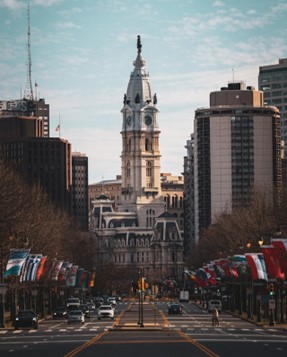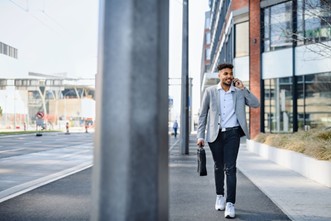
“Busy” is the default setting in today’s society and commuting can quietly chip away at the most valuable parts of our day - our time, energy, and peace of mind. Between traffic jams, overcrowded trains, and constant delays, professionals across the country often find themselves spending more time in transit than with their families, exercising, or pursuing personal passions. But in West Philadelphia, a growing number of professionals are reclaiming those lost hours by choosing a different path: walkable living.
For doctors racing between hospital shifts, professors managing tight academic schedules, or tech entrepreneurs pushing long hours, being able to walk to work is a game-changer. It reduces the mental and physical toll of commuting, offering more time for what truly matters.
Clark Park apartments are located near major institutions and nestled beside one of Philly’s most beloved green spaces, offering residents a rare combination of accessibility, comfort, and community. Living here means more than just a shorter commute - it means the chance to slow down, breathe deeper, and enjoy a lifestyle that supports both career goals and personal well-being.
The average American commute is around 27 minutes each way. That adds up to nearly five hours a week, or over 250 hours per year, spent just getting to and from work. For dual-career households, that number doubles.
And it’s not just time. Long commutes mean:
In West Philadelphia’s University City, the reverse is true. A 5- to 15-minute walk to work creates a ripple effect of positive change for professionals and families alike.
University City is home to some of the region’s largest and most prestigious institutions and a growing number of tech startups and life sciences companies. This high-density hub of education, research, and innovation has fueled a unique ecosystem where living close to work is a smart lifestyle choice.
University City prioritizes walkable urbanism: mixed-use developments, accessible transit, green spaces, and community amenities all within walking distance.
A short walk to work can reclaim anywhere from 1 to 2 hours of your day. That time can be reinvested into family dinners, early morning workouts, or simply more sleep. For young professionals and parents alike, this daily gift of time is invaluable.
Dr. Lena Garcia, a pediatrician at CHOP, notes the difference:
"Before we moved to West Philly, I was commuting from the suburbs and getting home just in time to put my kids to bed. Now I walk to work, and I’m home before 6:00. We cook together, play outside, and I’m not exhausted by the time I end my day."
Commuting by foot instead of car or transit reduces exposure to one of the most common sources of daily stress: traffic. Multiple studies have shown that people with long commutes report higher levels of anxiety, irritability, and even depression.
Walking, on the other hand, has proven mental health benefits. It boosts endorphins, reduces cortisol levels, and provides a meditative rhythm that many find grounding—especially on beautiful, tree-lined streets like those in West Philly.
Car ownership is expensive between gas, insurance, parking, tolls, and maintenance. Professionals who live close enough to walk or bike can often go without a second car or forgo driving altogether.
Additionally, eliminating or reducing reliance on public transit can save hundreds, if not thousands, of dollars annually. For households juggling student loans, childcare, or saving for a home, this financial freedom is a major bonus.

Another unexpected benefit of walkable living is the increased sense of community. When you're not isolated in your car, you're more likely to engage with neighbors, support local businesses, and feel a deeper connection to your environment.
University City thrives on these micro-interactions. Whether it’s bumping into coworkers at Clark Park’s farmers market, grabbing coffee at a local café, or attending a neighborhood concert, these small moments create a rich, lived-in fabric that improves social wellbeing.
It’s no surprise that walking to work also contributes to physical health. Regular walking can lower the risk of heart disease, high blood pressure, obesity, and type 2 diabetes. Unlike scheduled gym workouts, a walkable commute builds in exercise as part of your daily routine - without needing extra time or motivation.
For healthcare professionals, academics, and tech workers who spend hours sitting at desks or in labs, this daily activity can be a game-changer.
University City’s walkability enhances family life, too. Parents can drop off children at school or daycare on the way to work. Kids grow up walking to playgrounds, libraries, and after-school programs rather than relying on car rides.
Walkable neighborhoods are not only good for people, they're good for the planet. By reducing car dependence, this area contributes to lower carbon emissions, reduced noise pollution, and more efficient land use.
Organizations like the University City District (UCD) are actively working to improve infrastructure, safety, and beautification to make walking and biking even more accessible. Initiatives like “Green City Works,” bike share programs, and sidewalk improvement projects are designed to future-proof the neighborhood for sustainable, inclusive growth.
Of course, not every professional can live within walking distance of work. Housing availability and affordability remain pressing concerns, particularly as demand for walkable living rises. However, smart city planning, university investment, and nonprofit partnerships are helping expand access to more housing options for workers of all income levels.
There’s also the opportunity to expand what’s working here to other parts of West Philadelphia, creating a network of walkable hubs that enhance quality of life for all residents.
The walkable commute is more than just a perk - it’s a lifestyle shift that prioritizes people over pavement. It offers a solution to many of modern life’s most persistent challenges: stress, time scarcity, disconnectedness, and environmental impact.
By eliminating the daily grind of long commutes, professionals here are rediscovering what it means to live close, live fully, and live well.
If you’ve ever dreamed of stepping out your front door and arriving at work in less than 10 minutes - without traffic, stress, or sacrifice - it might be time to follow the footsteps of those who already call University City home. Your wallet, your schedule, and your sanity will thank you.